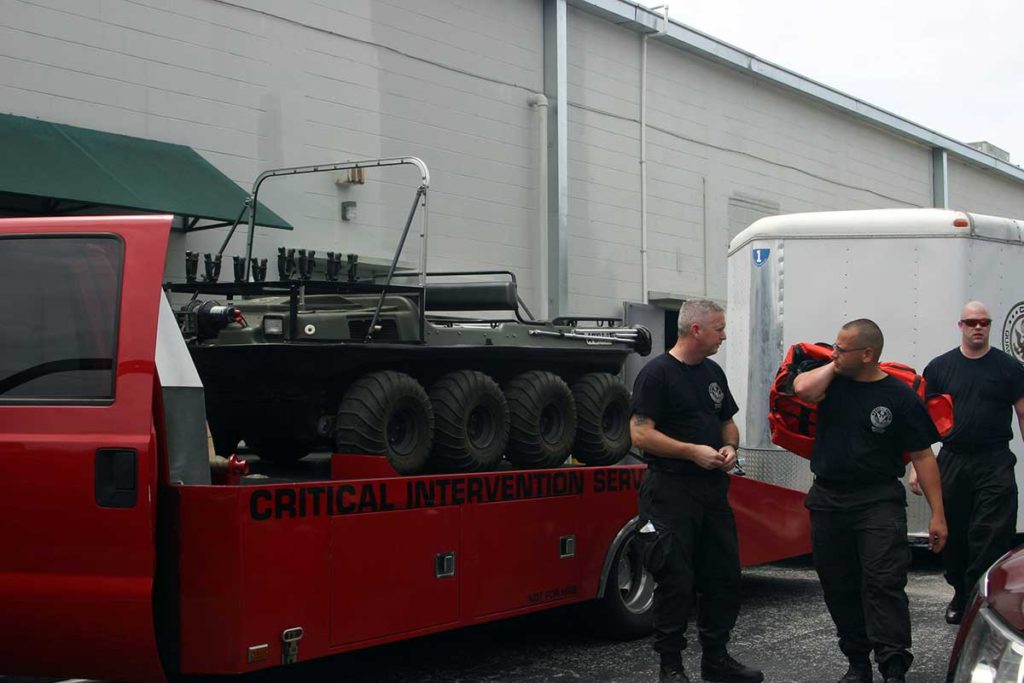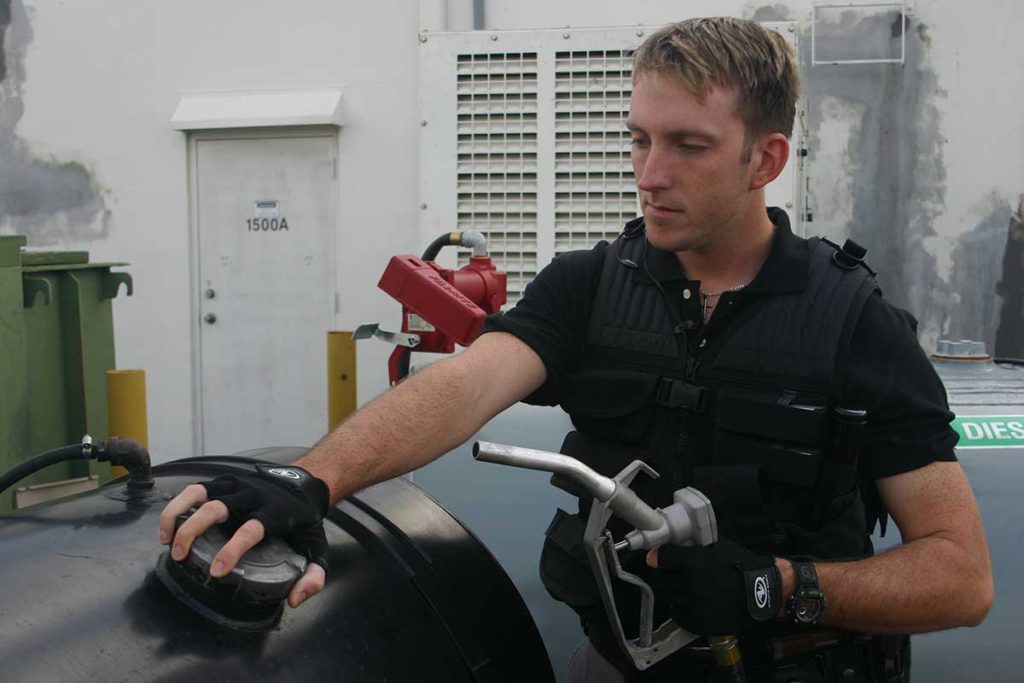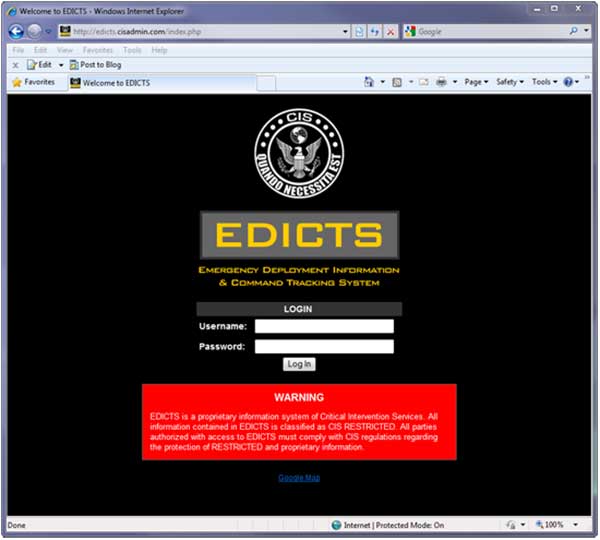The Critical Difference™
Security Deployments for Hurricanes & Natural Disasters
Over the past 17 years, CIS has earned a unique reputation for supporting clients with security services and logistical aid in the aftermath of hurricanes and other natural disasters.
In the aftermath of hurricanes and other natural disasters, security agencies reliant on local personnel and infrastructure are often unable to sustain effective operations without special access to outside sources of food, water, fuel, and personnel. Likewise, the magnitude of public safety issues, unpredictable consequences, and non-functional infrastructure in these situations easily overwhelm public authorities and limit the capacity of police to respond to general emergencies.
Organizations that fail to predict these problems in their business continuity plans by relying on local police and security companies often find themselves unprotected or paying unnecessary premiums for service.
Based on our experience in assisting clients during numerous hurricanes since 1993, CIS developed a unique infrastructure and logistical apparatus to sustain effective security operations in environments with damaged or limited infrastructure. As a result of these enhanced operational capabilities, our disaster response clients enjoy a number of benefits unavailable from other security companies.
CIS Disaster Response Teams Beyond security services
CIS disaster response teams provide a range of security services and mitigation assistance to companies and government agencies in the aftermath of hurricanes and other large-scale disasters. In addition to facility protection in afflicted zones, our disaster response officers aid in the recovery and transportation of assets, rescue of employees stranded in locations with damaged infrastructure, and protection of mobile assets such as power line trucks and supply convoys traveling in affected areas.
Although security is often our primary mission, our teams also assist clients by providing emergency communications, food, fuel, transportation, and even medical assistance.

Standards, Systems, & SOPs: The keys to security officer performance during hurricanes and natural disasters
Although many national-level security agencies have the capability to deploy large numbers of security officers during hurricanes and other natural disasters, few have the systems necessary to maintain high levels of performance as the operation scales in size. In order to meet the high demand for service in the aftermath of disasters, most national-level security companies shuffle personnel into the affected area without any special training or operational direction. Other agencies respond by subcontracting assistance, often with little vetting or attention to standardization of training and procedures. The result of these hasty mass-scale deployments is often a chaotic and uncontrolled atmosphere with inconsistent performance and professionalism.
To eliminate problems associated with mass scale deployment, CIS has implemented a number of unique controls. As a starting point, CIS requires that all security personnel participating in disaster response operations receive specialized training in disaster response and operate under a specialized Standard Operating Procedures (SOP). The CIS Disaster Response SOP is designed to ensure standardization of policy and protocol at CIS-protected sites. Parallel with officer training and operational guidance, CIS command and operations staff maintain close direction over field activities to ensure that personnel are operating in accordance with SOP.
If at any point the demand for our services approaches our possible capability to maintain maximum performance, we immediately halt taking on new assignments. At CIS, our hard-earned reputation for effective performance and reliability is far more critical than short-term revenues from disaster services.
Rapid Security Deployment Capability during hurricanes & natural disasters
As a benefit of our unique operations structure and logistical capabilities, CIS can often deploy advance team personnel throughout the Southeastern United States and activate the full resources of our Mobile Command Center (MCC) within 24 hours of notice. Once the MCC is activated and the CIS Personnel Resources and Deployment Team (PRDT) is mobilized, our disaster officer teams and logistical support personnel can be on-site anywhere throughout the Southeastern United States within 48-72 hours.
Reliable Security Services independent of local infrastructure
To ensure that CIS disaster security teams are capable of reliable and sustained operations regardless of local infrastructure, CIS maintains a complete inventory of deployment equipment and transportation systems:
- Mobile Command Center (MCC) Truck
- Electrical generators for field logistic stations and MMC
- Supply trailers and trucks
- Fuel bladders and fuel distribution equipment
- Water tanks and bladders
- Water purification system
- Rapid Deployment Food Stockpile: 1,000+ Meals-Ready-to-Eat (MREs)
- Reserve Food Stockpile: 29,000+ Group Rations
- Satellite telephones and satellite data links for field command personnel
- Tents, sleeping rolls, and camping equipment for personnel operating in locations without lodging options
- Portable field hygiene systems
With supply and transportation needs managed by our team of logistics coordinators, our disaster response officers can operate fully independent of local infrastructure for indefinite periods of time. This is a critical necessity for maintaining uninterrupted operations during major natural disasters, such as Hurricane Katrina.


Remote Access to Real-Time and Updated Information About Facilities and Assets Under Protection

For the benefit of clients with corporate offices located away from the affected area, CIS created a special portal in our EDICTS (Emergency Deployment Information and Command Tracking System) to provide clients with remote access to current information about the status of their facilities.
By using the web-based EDICTS client portal, corporate security and emergency management personnel located anywhere in the world can monitor field activities as reported to our Mobile Command Center (MCC) and view the latest reported conditions at their facilities.
In addition to providing information about the security status at protected sites, the EDICTS client portal provides updated information about the status of electricity, facility damage, facility hazards, work operations, generator fuel, local availability of food and gasoline, and local transportation conditions.
Access to Food, Fuel, and Other Types of Critical Support

In addition to providing security for clients in affected zones, CIS assists client organizations in obtaining essential logistical support to sustain company operations. By maintaining preferred vendor agreements with suppliers and transportation companies in addition to special arrangements with emergency management authorities, CIS is often able to assist clients in obtaining critical and uninterrupted supplies of food, fuel, and water in even the most challenging situations.
To facilitate logistical requests, EDICTS features a supply request module to provide clients with an easy method for ordering and tracking the delivery of supplies.
Contact Us
Contact us to discuss your unique needs by calling Tel. +01 (727) 461-9417 or by completing the following form:
The Words of Our Clients and Peers
Toll-free: (800) 247-6055 | Tampa Bay Area: (727) 461-9417 | Hillsborough: (813) 910-4247 | Orlando: (407) 420-7945

Critical Intervention Services
The Critical Difference™
Contact Us
The staff of CIS is dedicated to providing each client with the finest quality of protective services available.
Our commitment and dedication to professional, ethical, and protocol conscious service is our trademark.
Preserving, projecting, and protecting our clients’ image and interests is our business.
Copyright © 2020 Critical Intervention Services, Inc. ® Florida “A” License: A9900261 • Florida “B” License: B9200107
